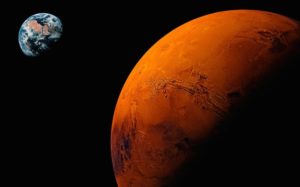MARS: Journey to the Red Planet

Also called the red planet because we see it like that from Earth, Mars is the fourth planet from the Sun and it’s named after the Roman god of war.
70,000 years ago, we started to conquer Eurasia from Africa. 50,000 years ago we arrived in Australia; 14,000 years ago – North America; 4,000 years ago – in the Pacific Islands; In 1821, we checked Antarctica on the list and in 1969 we stepped on the moon. Next stop: Mars.
Because Mars has a lot in common with our planet, many people considered leaving Earth and starting a new life on our neighboring planet. Considering that the Martian day is only half an hour larger than the earth’s, some researchers believe that it wouldn’t be very difficult to adapt to a new habitat.
The only problem is the lack of oxygen on Mars.
Although at the end of 2015 NASA scientists announced they had found liquid water at the poles of the Red Planet, it is still very difficult for a fragile body like ours to adapt very quickly in the Martian atmosphere.
Besides the fact that the sizes of Mars are different from those of our planet, some scientists are against a possible colonization outside of the Earth, because, they say, mankind should not behave like a parasite which leave its host and anchors to a new target.

Do I get to see a man on Mars?
This question was addressed to William Gerstenmaier, the current Associate Administrator for Human Exploration and Operations at, by a journalist at the age of 49 on a press conference which was held in Utah. The answer was more interesting than the question itself: ‘Yes, but “man” may not be the right word. We preffer to call it a human being. ‘
A journey to Mars would be extremely expensive
First, we should think of the Apollo moon landing that cost about 140 billion dollars, and considering that the Space Agency’s budget was 4 times higher than now.
A trip to Mars would cost about 450 billion dollars, which means a lot because of the fact that here on Earth are a lot of poor and starving people.
Some skeptics believe it would be a useless investment because mankind would take too long to populate the red planet. A trip to Mars could not even carry many passengers, so we should do very many roads to bring more people, which would lead to high costs that no one allows.
Mikhail Kornienko believes a space station would have a sense for those who want to go to Mars. He remembers what it was like to return to Earth with the Soyuz capsule.
‘Steppe air entering the cabin after the hustle-n of the descent and you will understand that everything is done. You can’t get enough of the air. Is like you wish to cut the air with a knife and spread it on a slice of bread.’

Source: National Geographic

10 Replies to “MARS: Journey to the Red Planet”
What if Earth will be destroyed? Were we should go? I say it is better to try!
We should spend money helping our planet, not searching for life somewhere else
They are already preparing for the flight.
I wonder if they will come back.
I think they’ve already been on Mars, but they keep it secret
That is highly unlikely! If they sent a human to Mars, that person would have died not long into the flight. There just is not enough science to make such a trip.
Wonderful…
I just watched a movie. It is called ‘The space between us’. What will happen if the movie becomes reality?
Good movie. Everything seems to be real. It has a good story.
The argument that all of our resources should be spent here on Earth is an extremely weak starter.
“We” have gained so much from everything NASA and other space organizations have created and discovered is enormous. Reaching out towards settling on other heavenly bodies would, in my opinion push us much faster than we are already moving, into the future in many areas of technology, health and wealth.
I put the word “WE” in quotes because it is frustrating when scientist and others consider “we” as somehow the higher evolved humans on Earth. As though there are different species of “humans”. It is clear that the “we” in the above article is referring to the white man. Why does this matter? Quite a bit of this article goes into the advancement of the so called white man. Modern day science is still trying in many social sciences to prove the white man is the pinnacle of human evolution which is a false science/primis as well. The facts are that everywhere this article says “we” discovered, there were already people there that more than likely migrated out of central Africa.
Haven’t even dealt with global warming yet, don’t have the infrastructure and widespread use of electric cars, but let’s make mars habitable. Sad display of foresight.